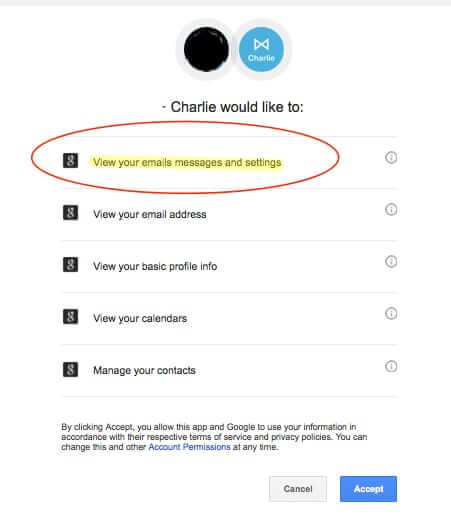Tag: Privacy
New Charlie Virtual Meeting Assistant App – a Privacy Nightmare?
Meet Charlie, the Virtual Meeting Assistant app. The Charlie app’s site says that with Charlie you will “make a killer impression on whoever you’re meeting,” and Business Insider claims that Charlie “wants to give everybody the perks of a personal assistant.” But Charlie comes with a privacy cost.
Free Email Privacy and Security Tester
Email Privacy Tester is exactly what it says – a way to test your email program for privacy and security leaks. And it’s free!
Yahoo: We Will Track You Even if Your Browser Says “Do Not Track”
Last week Yahoo quietly let slip that Yahoo is no longer honoring your “Do Not Track” request when you are on a Yahoo website. They announced this on their “Global Public Policy blog” which is on Tumblr, not even on a Yahoo property.
Full Text of Obama’s Speech on NSA Phone Metadata Collection Program, January 17, 2014
In his speech regarding changes to the NSA’s Section 215 phone metadata collection and surveillance program, President Barack Obama stated outright, “I am ordering a transition that will end the section 215 bulk metadata program as it currently exists.” During his speech (full transcript below), President Obama also announced that the federal government will need to go to the the Foreign Intelligence Surveillance Court (FISA) every time that they want to search data, rather than relying on previous orders.
NSA Co-Traveler Program Tracking Every Cell Phone Movement and Location
The newest reveal about the NSA’s surveillance activities is the existance of the NSA Co-Traveler program, through which the NSA is tracking the location and movements of the majority of cell phones on the planet, relationship-mapping every cell phone with every other cell phone.
Phone Number Reputation (“PhoneID Score”) Being Created Based on Two-Factor Authentication
It’s time to worry about your phone number reputation and mobile identity. The company that provides two-factor authentication for the users of sites such as Google and Facebook has been quietly amassing the phone numbers of those users, and is now assigning a phone number reputation, which it calls a PhoneID Score – or your Mobile Identity – to all of those phone numbers being used for two-factor authentication and, it seems, any other phone numbers the data for which they have access.
Microsoft Tries to Allay Fears That the New XBox One Will be Spying On You
There has been a lot of speculation that the new Microsoft XBox One (XBox 1) will essentially be spying on its owners. Well, ‘spying’ may be too strong a word but, at least, that it will have the potential to spy on its owners when combined with the required Kinect motion-detecting web-cam, an ever-vigilant watching and listening device connected to the Internet. These concerns arose after rumours started spreading that the new XBox One required a near 24/7 Internet connection and requires the Kinect.
Companies Invited to Mine Massive National Database of K-12 Students’ Personal Information
It’s bad enough that Facebook is exploiting the data of minors who have accounts on Facebook. Now, the newest assault on childrens’ privacy is the recent decision to allow marketers access to the data in a massive databsase that contains the private data of millions of children – k-12 students – incuding their name and address, test scores, attendance records, sometimes even their social security number, and which lists whether they have learning disabilities, and more. So far New York and Louisiana have expressed their intention to enter the data of nearly all of their students, and Massachusetts, Kentucky, Georgia, North Carolina, Delaware and Colorado have said they will enter data from “select districts”.
California Law AB 242 Would Require Privacy Policies to be Written at an 8th Grade Reading Level and be No Longer Than 100 Words
Proposed California law AB 242, introduced by Assemblyman Ed Chau, is creating quite a buzz due to its wording, or rather, proposed lack of wording. AB 242 would require that all commercial websites and services offered through the Internet which collect personal information about California consumers make its privacy policy be written at a level of 8th grade reading, and be no longer 100 words.
All About Facebook Graph Search: An Expose in Pictures
By now you may have heard about Facebook’s Graph Search. And you may or may not already have Facebook’s Graph Search, as Facebook is rolling it out slowly across their membership. If you don’t already have it (or have it but have not yet dived into it), here is an illustrated tour – or, really, an exposé – of Facebook Graph Search (perhaps more aptly called “Facebook Graphic Search”), explained in pictures.
The Anonymous Social Network Where Nobody Knows Your Name (But Everybody Has Your Number)
If you’re tired of the privacy concerns of Facebook, the anonymous social network called Social Number may be right up your alley. Giving the question, “what’s your number” a whole new meaning, Social Number lets users pick a user number, which is their only identifier on the social network. That means users will not have user names or identifying photos, just assigned numbers.
What is Twitter Vine? We Explain
Twitter released their new video sharing service, Twitter Vine, Thursday, which allows Twitter users to film and share small, six-second-long looping video clips. Twitter says that these small little snippets are in line with its model of Tweets being limited to 140-character-or-less model for Tweets. Michael Sippey, Twitter’s vice president for product, wrote about Twitter Vine on Twitter’s blog on Thursday, “Like Tweets, the brevity of videos on Vine (6 seconds or less) inspires creativity. Now that you can easily capture motion and sound, we look forward to seeing what you create.”
Google Releases Transparency Report Which Shows More Government Surveillance
Today Google posted some news on their blog, along with the release of their Transparency Report, which shows increasing requests from the government for private user data. In fact, the report shows that, of all the governments in the world, the U.S. leads the pack in personal information requests.
Kim Dotcom Launches New Mega Dropbox-style File Storage and Sharing Site
The scene was a pudgy man being chased around by scantily clad girls, but it wasn’t an homage to Benny Hill, it was Kim Dotcom’s launch party for his re-emergence back into the .com world – his new site, Mega (not to be confused with his now defunct file sharing website, Megaupload). Mega outdoes Dropbox by offering 50GBs of free file storage, unlike the 2GBs offered by Dropbox.
Facebook Quietly Turns Off Ability of Users to Hide Their Facebook Profiles From Searches, Says it Has Nothing to Do With New Graph Feature
It has come to the surface that Facebook took away the ability to hide profiles from search results this past December, which is awfully suspicious timing with the subsequent announcement of their new “graph search” feature. With graph search relying on Facebook user profile content for its search results, Facebook needed the extra information from previously private profiles.








